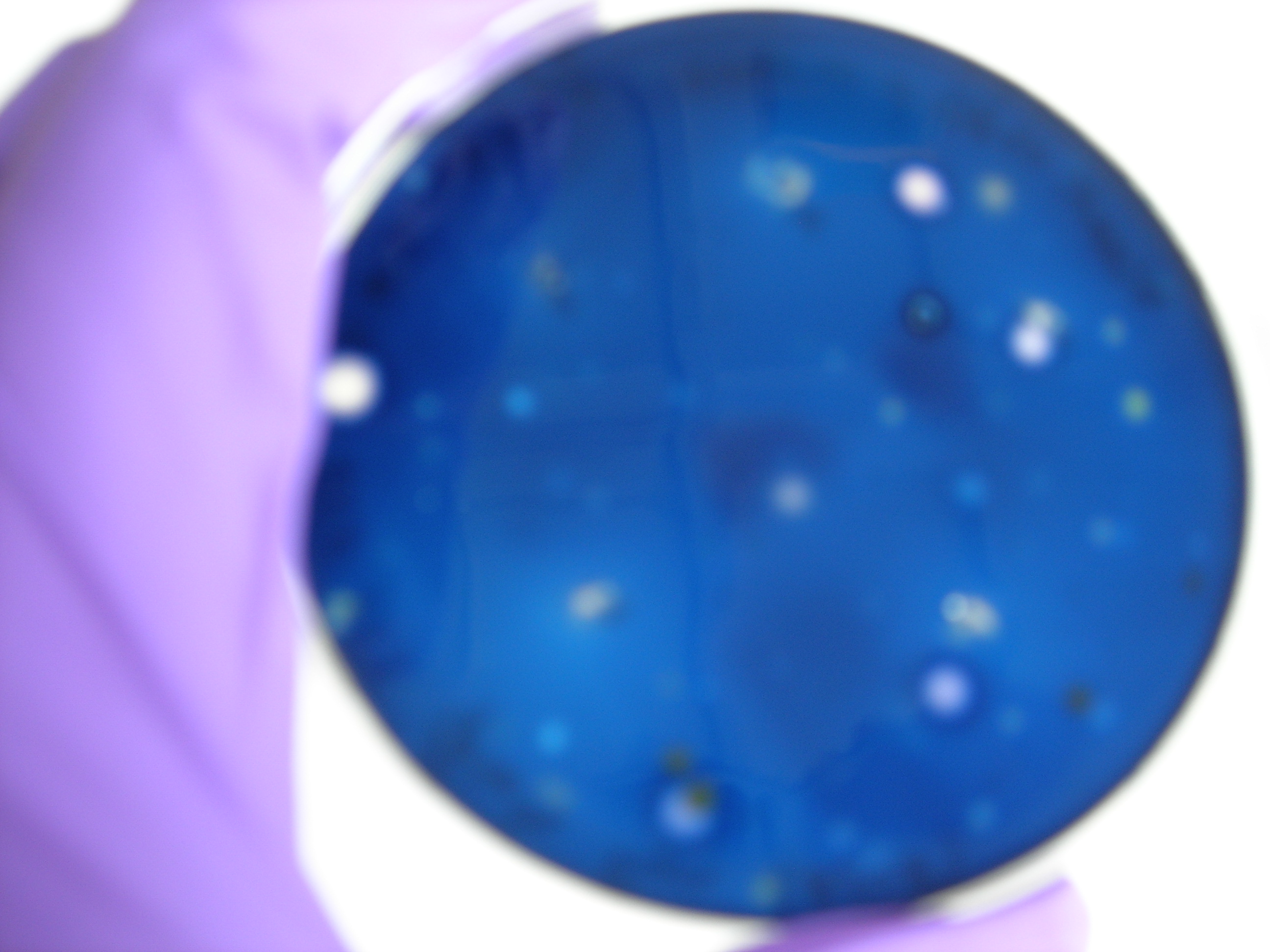|
Working with B.subtilis
Building on the work of the last year's Cambridge iGEM team, we are exploring applications of the gram-positive chassis B.subtillis. Easy to handle and transform, this bacterium is much better to use than E.coli wherever protein import/export is concerned, e.g. in our signalling project. An important part of our effort is to establish standard protocols and parts to work in B.subtillis, characterise control elements, and develop new vectors. You can find our Bacillus protocols here.
Creating new Biobrick-compatible B.subtilis vectors
We are using the In-Fusion™ PCR method from ClonTech to create new Biobrick-compatible integrative and episomal vectors. These vectors will allow us to insert Biobricks into the Bacillus subtilis genome at the AmyE locus and as a 3-5 copy plasmid that will replicate autonomously in Bacillus.
Successful transformation of Bacillus
Transformation with episomal vectors
ECE166 : High-level constitutive expression of a Green Fluorescent Protein (with the promoter Pupp)
 Observation with microscope (x20) : B.S. transformed with ECE166 Transformation with integration vectors
ECE153 and ECE112 : Transformation in IA751 : Amylase test
 IA751 transformed with ECE153 : SUCCESFUL TRANSFORMATION, no zone of clearing  IA751 transformed with ECE112 : SUCCESFUL TRANSFORMATION for 4 colonies out of 5, no zone of clearing
Testing B.subtilis promoters and RBSs
We are seeking to test the expression strength and response to inducers in several promoters in B.subtilis, in combination with different Bacillus-specific ribosome binding sites.
B. subtilis Promoter Testing with Beta-galactosidase Assay
We are aiming to characterize four different Bacillus subtilis promoters on the ECE112 backbone using the beta-galactosidase assay. Protocol for beta-galactosidase assay as described [http://openwetware.org/wiki/Beta-Galactosidase_Assay_(A_better_Miller) here]
B. subtilis Promoters to be Tested:
- Pupp - a strong constitutive Bacillus cereus promoter present on B. subtilis vector ECE166
- Ppac - constitutive, present on B. subtilis vector ECE151
- Pspac - IPTG inducible, present on B. subtilis vector ECE151
- Pxyl - xylose inducible, present on B. subtilis vector ECE153
Information about the B. subtilis vectors can be found [http://openwetware.org/wiki/IGEM:Cambridge/2008/Turing_Pattern_Formation/Vectors here]
The Schematic:
- PCR the 4 promoters out of the corresponding B.subtilis vectors using primers containing the standard biobrick restriction sites
- Transform TOP10 with Biobrick I732007
- Single colony PCR the transformed TOP10 cells and miniprep the colony containing I732007
- Digest the promoter with EcoRI and SpeI
- Digest I732007 plasmid with EcoRI and XbaI
- Ligate the promoter to the I732007 backbone
- Transform TOP10 cells with the new construct which should have Ampicillin resistance
- Single colony PCR for successfully transformed cells and miniprep for more of new construct
- Digest the new construct with EcoRI and BamHI
- Digest ECE112 vector with EcoRI and BamHI
- Dirty ligation of the promoter to ECE112 vector
- Single colony PCR for the plasmid and miniprep
- Transform B. subtilis with the plasmid which contains amyE for integration and lacZ for beta-galactosidase assay
- Perform beta- galatosidase assay!
Links
- Chris French's [http://openwetware.org/wiki/Cfrench:BacTrans1 protocol on transforming B. subtilis]
- We have last year's protocol; not sure if it's trustworthy, need to compare with online resources
- Protocol from BCSG catalog
- used in Cornell bacteriology course, probably should start here
[http://www.sciencedirect.com/science?_ob=ArticleURL&_udi=B6T30-3VCK5Y0-3&_user=1495569&_rdoc=1&_fmt=&_orig=search&_sort=d&view=c&_acct=C000053194&_version=1&_urlVersion=0&_userid=1495569&md5=847137ffc5cf267e12b5625aaadecb0e B. Subtilis Transformation Protcol - Electroporation]
[http://aem.highwire.org/cgi/content/abstract/71/12/8818 Bongers et al. … of a Subtilin-Regulated Expression System in Bacillus subtilis: Strict Control of Gene Expression …. Applied and Environmental Microbiology (2005)]
- SURE: handy expression system for B. subtilis
- What about feedback/regulation effects of subtilin on the cell
[http://lib.bioinfo.pl/pmid:18261893 Expression and characterization of aiiA gene from Bacillus subtilis BS-1.]
- (Some strains of) Bacillus subtilis produces a gene called aiiA that degrades AHL molecules from gram-negative bacteria
- this is biobricked
Links to Cambridge 2007 Wiki
- [http://www.ccbi.cam.ac.uk/iGEM2007/index.php/Bacillus_subtilis_SynBio_chassis B. subtilis group]
- [http://www.ccbi.cam.ac.uk/iGEM2007/index.php/Detailed_background_information_-_B._subtilis B. subtilis group: more info]
|